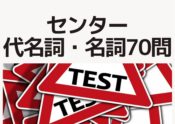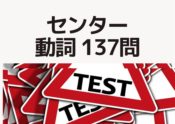これだけ抑えれば大丈夫! センターによく出る面倒な「it」のまとめ

大手予備校で中1から高3の基礎クラスから東大クラスまでほとんどのクラスを担当しました。映像授業にも多数出演経験あり。
元東海大非常勤講師。
「大学入試英語解く得!」は最高PV数 34,212 / 日
質・量ともに日本一分かりやすい大学入試英語対策ページを目指します!
資格:英検一級、通訳案内士(英語)、TOEIC950点
趣味:海外旅行、食べ歩き
特技:将棋アマ六段 (全国レーティング選手権優勝 1998)
元技術翻訳者、元富士通
「センター英語頻出英文法」の第15回は「it」です。
頻出英文法はこれが最後になります。最後にふさわしくかなりボリュームがあります。
「it」は個々に習うことは多いので、全く知らない内容は少ないのでは?と思いますが、部分的には知らなかった話も多いと思うので抜け落ちのないよう網羅的に学習しましょう。
ここに書いた話は「it」の全貌とまではいきませんが、重要な話はもらさずに書いてあります。
もちろん最後にはセンターの過去問が今回は14問!もあります。
今回の内容
1. itを使った例文
1-1 次の例文の訳+itが何を指している(どういう働きをしているか)考えて下さい。
①It is difficult for him to persuade her.
②It is important that you follow the rules.
③I thought it difficult for him to persuade her.
④I found it surprising that she didn’t know his name.
⑤It takes three hours to get to the airport.
⑥It makes no difference who you are.
⑦I make it a rule never to eat between meals.
⑧People take it for granted that it is hot in summer.
⑨It gets dark at around seven in the summer.
⑩You will make it if you hurry.
⑪It seems that my dog understands English.
⑫It is because pandas look cute that we like them.
1-2 1-1の解答
①It is difficult for him to persuade her.
形式主語 It = for him to persuade her
彼が彼女を説得するのは難しい。
②It is important that you follow the rules.
形式主語 It = that you follow the rules
あなたがそのルールに従うことは大切だ。
③I thought it difficult for him to persuade her.
形式目的語 it = for him to persuade her
彼が彼女を説得するのは難しいと私は思った。
④I found it surprising that she didn’t know his name.
形式目的語 it = that she didn’t know his name
彼女が彼の名前を知らないのは驚きだ。
⑤It takes three hours to get to the airport.
形式主語 It = to get to the airport
その空港に行くのに3時間かかる。
⑥It makes no difference who you are.
形式主語 It = who you are
あなたが誰であるかは重要ではない。
⑦I make it a rule never to eat between meals.
形式目的語 it = never to eat between meals
間食は決してしないことにしている。
⑧People take it for granted that it is hot in summer.
形式目的語 it = that it is hot in summer
夏が暑いのは当然だと人々は考えている。
⑨It gets dark at around seven in the summer.
天候のit
夏は7時頃に暗くなる。
⑩You will make it if you hurry.
状況のit
急げば間に合いますよ。
⑪It seems that my dog understands English.
状況のit
私の犬は英語を理解しているように思える。
⑫It is because pandas look cute that we like them.
強調構文
パンダを好きなのはパンダが可愛いからだ。
2. itの働き
2-1 形式主語 (仮主語)
形式主語は後ろにくるto V、that節あるいは名詞節をitを使って最初に言う表現。
「それ」は~と言っておいて「それ」は自体は後ろにあるという仕組みです。
なんといっても①のように後ろにto Vが来る形がメインです。
①It is difficult for him to persuade her.
It = for him to persuade her
彼が彼女を説得するのは難しい。
なのでFor him to persuade her is difficult.
でもOKですが、この文のように意味上の主語(for+人)が来る場合は特に不格好な感じがします。
また②にようにthat節が後ろにくるのもよくある形です。
②It is important that you follow the rules.
It = that you follow the rules
あなたがそのルールに従うことは大切だ。
これもThat you follow the rules is important.
でもOKですが、やはり不格好。Itが頭に来る方がすっきりしていますね。
2-2 形式目的語 (仮目的語)
形式目的語は目的語の位置にitがくるだけで、考え方は仮主語とそっくりです。
形式主語の方が目にする回数ははるかに多いはずですが、実はセンター英語は形式目的語が大好きです。
詳しくはこちらの記事もご参照下さい。
こちらでも書きましたが形式目的語は特徴がはっきりしていて、使う動詞もほぼ限られています。
【 形式目的語構文の特徴 】
①文型はSVOC
②真の目的語はほとんどto Vかthat節
【 形式目的語を取ることの多い動詞 】
①「思う」系の動詞 find, believe, consider, think, suppose
②「知覚動詞」のhear, feel / leave, owe など
③SVOCの王様make
③I thought it difficult for him to persuade her.
it = for him to persuade her
彼が彼女を説得するのは難しいと私は思った。
最初はitが不定詞の場合。動詞はthinkが使われています。
④I found it surprising that she didn’t know his name.
it = that she didn’t know his name
彼女が彼の名前を知らないのは驚きだ。
次にitがthat節の場合。動詞はfindが使われています。
文型はSVOCで使われる動詞も限られているため、形式目的語は慣れると簡単です。でもなぜか形式主語よりも苦手にしている人が多いので、ここで簡単であることを確認しておきましょう。
2-3 形式主語を使った慣用表現
慣用表現もいくつかありますが、なんと言っても重要な表現は次の2つ
・It takes (人) 時間 to V (人)がVするのに時間がかかる
・It costs (人) 費用 to V (人)がVするのに費用がかかる
⑤It takes three hours to get to the airport.
It = to get to the airport
その空港に行くのに3時間かかる。
この形は時間のitと言うこともありますが、to 以下を指しているので形式主語でもあります。
また動詞の後に人を置くと意味上の主語になります。
It cost him £200,000 to build the house.
彼がその家を建てるのに 20 万ポンドかかった。
また次の表現ではItが指すものはthat節ではなく名詞節(who you are)になっています。
⑥It makes no difference who you are.
It = who you are
あなたが誰であるかは重要ではない。
make no difference は「違いがない」→ 「重要でない」 でないという意味です。
2-4 形式目的語を使った慣用表現
形式目的語を使った重要表現は以下の6つ。
【 形式目的語を取る慣用表現 】
①make it a rule to V 「Vすることにしている」
②hear it said that ~ 「~と言われるのを耳にする」
③see to it that ~ 「~するよう気をつける」
④take it for granted that ~「~を当然のことと思う」
⑤owe it to 人 that ~「~は人のおかげだ」
⑥leave it to 人 to V 「Vするのを人に任せる」
⑦I make it a rule never to eat between meals.
it = never to eat between meals
間食は決してしないことにしている。
⑧People take it for granted that it is hot in summer.
it = that it is hot in summer
夏が暑いのは当然だと人々は考えている。
これらの表現は整序英作文でもよく狙われます。
2-5 天候のit (状況のit)
⑨It gets dark at around seven in the summer.
天候のit
夏は7時頃に暗くなる。
これは良いですかね?英語は主語が必要なので特に意味のないitがたくさんあるわけですが。
それを天候のitと言ったり、意味のないitをまとめて状況のitと言ったりするわけですね。
2-6 状況のitを使った慣用表現
状況のitを使った慣用表現も細かくいえばかなりありますが、以下のものは特に頻出です。
【 状況のitを使った慣用表現 】
make it 「成功する、間に合う、出席する」
get it 「わかる、叱られる」
take it easy「気楽にやる」
mean it 「本気だ」
⑩You will make it if you hurry.
状況のit
急げば間に合いますよ。
中でも重要なのがmake it。訳語が多いのがやっかいですが全て「うまくいく」プラスのイメージです。
2-7 It seems that ~ など
It seems that の構文のItは形式主語ではなく、状況のitの仲間です。
・It seems that ~ 「~のように思われる」
・It appears that ~「~のように思われる」
・It happens that ~「たまたま~する」
⑪It seems that my dog understands English.
状況のit
私の犬は英語を理解しているように思える。
It seems that my dog understands English. = My dog seems to understand English.
この書き換えも重要ですね。
2-8 強調構文
it is ~ thatの強調構文は名詞と副詞を強調できますが、副詞は副詞句や副詞節も強調できることに気をつけましょう。
It was in the park that Toshi met Taka yesterday.
昨日トシがタカに会ったのはその公園の中だ。
⑫It is because pandas look cute that we like them.
強調構文
パンダを好きなのはパンダが可愛いからだ。
3 センターで出た!it
1. Yukio: Did you hear that a new entrance ID system will be introduced next month?
Lucas: Really? Do we need it? I ( )( )( )( )( )( ) to replace the current system.
【 ①cost ②how ③it ④much ⑤will ⑥wonder 】
(センター2019年 本試験)
2. Keita: You have so many things in my room.
Cindy: I know. Actually, ( )( )( )( )( )( ) it neat and clean.
【 ①difficult ②find ③it ④I ⑤keep ⑥to 】
(センター2017年 本試験)
3. “Did you install that computer software you bought last week?” – “Yes. And ( )( )( )( )( )( ) use.”
【 ①easy ②finding ③it ④I’m ⑤to 】
(センター2012年 本試験)
4. Some people find ( ) difficult to economize on mobile phone costs even when times are hard.
①everything ②it ③that ④things
(センター2011年 本試験)
5. “We’ll be having a party for Maria next Friday. Can you ( ) it?”
①come ②get ③go ④make
(センター2011年 追試験)
6. Has it really been that long? It ( )( )( )( )( ) when we last met.
【 ①it ②only yesterday ③seems to me ④that ⑤was 】
(センター2008年 本試験)
7. How did it ( ) about that summer in Tokyo is hotter than it used to be?
①come ②take ③happen ④occur
(センター2006年 本試験)
8. Does having picture on a menu ( )( )( )( )( ) to order?
【 ①to decide ②what ③make ④easier ⑤it 】
(センター2005年 本試験)
9. What everyone hates most about driving in big cities is the time ( ) to find a parking space.
①it makes ②that makes ③it takes ④that takes
(センター2005年 追試験)
10. Before I went to the U.S. I had ( )( )( )( )( ) in a foreign country.
【①would be like ②what ③it ④no idea ⑤to live 】
(センター2005年 追試験)
11. Everyone thought ( )( )( )( )( ) to look the door when you went out.
【 ①of ②you③it ④to forget ⑤very careless 】
(センター2002年 追試験)
12. “You are coming with us to the beach on Sunday, aren’t you?”
“I’m really sorry, but I won’t be able to ( ) it after all.”
①give ②make ③ miss ④ save
(センター2001年 本試験)
13. Alan gave up his job as ( )( )( )( )( ) with his boss.
【 ①found ②he ③impossible ④it ⑤to work 】
(センター2001年 追試験)
14. It’s a ( ) your wife couldn’t come. I really wanted to meet her.
①harm ②shame ③sorrow ④trouble
(センター2000年 本試験)
4 センターで出た!it 解答・解説
4-1 1.-5.
1. Yukio: Did you hear that a new entrance ID system will be introduced next month?
Lucas: Really? Do we need it? I ( )( )( )( ) ( )( ) to replace the current system.
【 ①cost ②how ③it ④much ⑤will ⑥wonder 】
(センター2019年 本試験)
正解 ⑥②④③⑤①
I wonder how much it will cost to ~
・I wonder 「~かなと思う」
・間接疑問文なのでit will cost の語順になる
・この it は形式主語でit = to replace the current system
現在のシステムと置き換えるのにいくらかかるのだろうか。
2. Keita: You have so many things in my room.
Cindy: I know. Actually, ( )( )( )( )( )( ) it neat and clean.
【 ①difficult ②find ③it ④I ⑤keep ⑥to 】
(センター2017年 本試験)
正解 ④②③①⑥⑤
・形式目的語の問題です。
I find it difficult to keep it neat and clean.
部屋をきちんと綺麗にしておくのは難しいということが分かるわ。
3. “Did you install that computer software you bought last week?” – “Yes. And ( )( )( )( )( ) use.”
【 ①easy ②finding ③it ④I’m ⑤to 】
(センター2012年 本試験)
正解 ④②③①⑤
・形式目的語の問題です。ここでは動詞が進行形になっていますね。
“Did you install that computer software you bought last week?” – “Yes. And I’m finding it easy to use.”
使うのが簡単だと分かってきているところです。
4. Some people find ( ) difficult to economize on mobile phone costs even when times are hard.
①everything ②it ③that ④things
(センター2011年 本試験)
・形式目的語です。4択で出題されるのは少し珍しい感じ。
経済的に苦しいときでさえも、携帯電話の費用を節約するのは難しいと思う人もいる。
5. “We’ll be having a party for Maria next Friday. Can you ( ) it?”
①come ②get ③go ④make
(センター2011年 追試験)
・make it 「うまくいく」イメージ。ここではパーティーがある話をしているのでここでは「出席する」という意味になります。
来週の金曜日にマリアのためにパーティをやるんだけど、来れますか?
4-2 6.-10.
6. Has it really been that long? It ( )( )( )( )( ) when we last met.
【 ①it ②only yesterday ③seems to me ④that ⑤was 】
(センター2008年 本試験)
It seems to me that it was only yesterday when we last met.
・It seems の形と強調構文が合体した文です。ここではonly yesterdayと副詞句が強調されています。
ほんとうにそんなに長かった(長い時間が過ぎたの)ですか?最後に会ったのがほんの昨日のように私には思えます。
7. How did it ( ) about that summer in Tokyo is hotter than it used to be?
①come ②take ③happen ④occur
(センター2006年 本試験)
・come aboutは「起こる、生じる」
・元々は以下の形式主語表現からきている。 It comes about that~「~ということが起こる」
どのようにして東京の夏は昔より暑くなったのだろう。
8. Does having picture on a menu ( )( )( )( )( ) to order?
【 ①to decide ②what ③make ④easier ⑤it 】
(センター2005年 本試験)
解答 ③⑤④①②
Does having picture on a menu make it easier to decide what to order?
・形式目的語です。
・what to order「何を注文すべきか」
メニューに写真が載っていれば、何を注文するか決めるのがもっと容易になりますか。
9. What everyone hates most about driving in big cities is the time ( ) to find a parking space.
①it makes ②that makes ③it takes ④that takes
(センター2005年 追試験)
・the time と カッコの間に関係代名詞の省略
・ベースとなる文は It takes the time to find a parking space. 時間・形式主語のItですね。
大都市で運転すると、だれもが最も嫌なのは、駐車スペースを見つけるのにかかる時間である。
10. Before I went to the U.S. I had ( )( )( )( )( ) in a foreign country.
①would be like ②what ③it ④no idea ⑤to live
(センター2005年 追試験)
解答 ④②③①⑤
・What is S like ~?「Sはどのようなものか」がベースとなる文。
・間接疑問文なので平叙文の語順。
・it = to live in a foreign country 形式主語
・I have no idea ~「~は全く分からない」
Before I went to the U.S., I had no idea what it would be like to live in a foreign country.
アメリカへ行く前は、外国に住むことがどのようなものになるのか全く分からなかった。
4-3 11.-14.
11. Everyone thought ( )( )( )( )( ) to look the door when you went out.
【 ①of ②you ③it ④to forget ⑤very careless 】
(センター2002年 追試験)
解答 ③⑤①②④
Everyone thought it very careless of you to forget to look the door when you went out.
・形式目的語
・careless of you は you = careless の関係がある。
外出する時にドアに鍵をかけるのを忘れるとは、あなたはとても不注意だったと誰もが思った。
12. “You are coming with us to the beach on Sunday, aren’t you?”
“I’m really sorry, but I won’t be able to ( ) it after all.”
①give ②make ③ miss ④ save
(センター2001年 本試験)
・make it 「出席する」
「日曜日に君も一緒にビーチへ行くんだよね」「大変申し訳ないんだけれど、結局行けなくなっちゃったんだ」
13. Alan gave up his job as ( )( )( )( )( ) with his boss.
【 ①found ②he ③impossible ④it ⑤to work 】
(センター2001年 追試験)
解答 ②①④③⑤
・形式目的語
Alan gave up his job as he found it impossible to work with his boss.
アランは、上司とうまく一緒に仕事をすることができないとわかったので仕事を辞めた。
14. It’s a ( ) your wife couldn’t come. I really wanted to meet her.
①harm ②shame ③sorrow ④trouble
(センター2000年 本試験)
・shame 「残念なこと」It’s a shame (that) ~のItは形式主語。
・It’s a shame (that) ~=It’s a pity (that) ~「~は残念だ」
・harm「害」sorrow「悲しみ」trouble「面倒なこと」
あなたの奥さんが来られなかったのは残念です。
大手予備校で中1から高3の基礎クラスから東大クラスまでほとんどのクラスを担当しました。映像授業にも多数出演経験あり。
元東海大非常勤講師。
「大学入試英語解く得!」は最高PV数 34,212 / 日
質・量ともに日本一分かりやすい大学入試英語対策ページを目指します!
資格:英検一級、通訳案内士(英語)、TOEIC950点
趣味:海外旅行、食べ歩き
特技:将棋アマ六段 (全国レーティング選手権優勝 1998)
元技術翻訳者、元富士通







